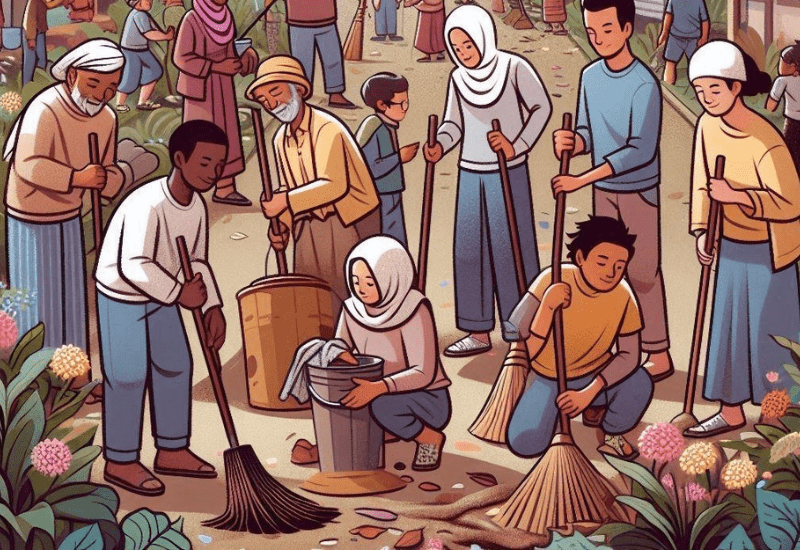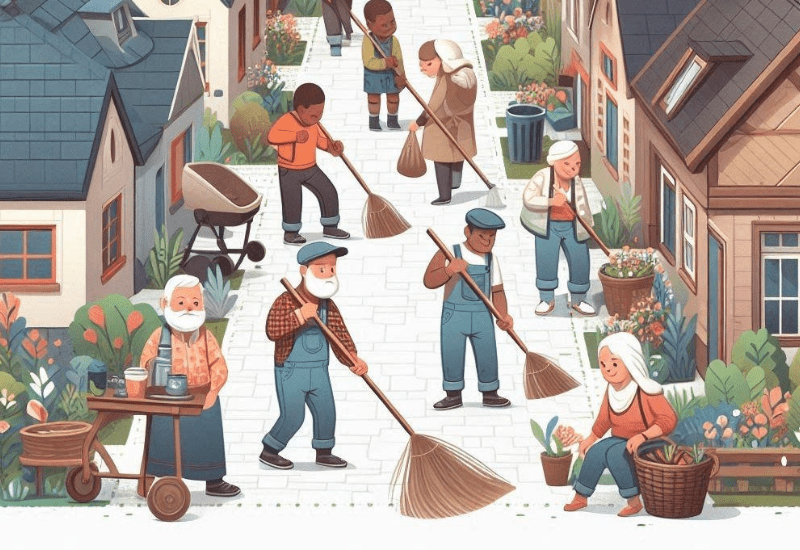Imagine a bustling town square where neighbors know each other by name, everyone chips in to keep the streets clean, and children play in safe, well-maintained parks. It might sound idyllic, but communities like this exist because individuals come together to make them that way. Community involvement, even in small ways, helps create healthy, positive environments where people thrive.
Contributing to society means taking action that benefits others, whether in big or small ways. It’s about using our time, skills, and energy to support those around us. When each of us does our part, the whole community becomes healthier and more connected. Our actions, though they may seem small, build up to make a big difference in the lives of many.
For example, when we plant a tree, we’re not just helping today; we’re creating a better future. That one tree provides shade, cleans the air, and adds beauty for years to come. By showing kindness and working together, we inspire others to join in, making our communities stronger and more welcoming for everyone.
How to Contribute to Society to Make a Positive Impact

Here’s a closer look at some effective ways to make a positive impact in society. These strategies offer meaningful ways to get involved, no matter your background, skills, or interests. Dive into each idea and think about how it might fit into your life. Remember, even small actions can create a ripple effect in the community.
1. Volunteering
Volunteering is one of the most direct and impactful ways to help others. It allows you to give your time and energy to causes that matter and directly see the difference you’re making. Here are two specific ways to get involved:
Community Services:
Many local shelters, soup kitchens, and elder care homes rely on volunteers to function. For example, at a soup kitchen, you can help prepare and serve meals to people experiencing homelessness or financial hardship. In elder care homes, simply spending time with residents, chatting, or even reading to them can brighten their day. Many elderly people feel isolated, and your companionship can make them feel valued and loved. Community services not only help others but also open your eyes to different life experiences, encouraging empathy and understanding.
Mentorship Programs:
If you have a specific skill or area of expertise, consider sharing it by mentoring someone who could benefit from your knowledge. Mentorship is especially valuable for young people who are building their careers or exploring their passions. Through mentorship, you can help someone improve their study habits, teach them about career opportunities, or offer guidance on personal growth. For example, if you’re knowledgeable in coding, you could volunteer at a youth tech club and inspire young learners. Mentorship creates a positive cycle of learning and support that benefits both the mentor and mentee.
2. Promoting Education and Literacy
Education has a transformative power. It helps people improve their lives, find better job opportunities, and understand the world. Promoting education and literacy can benefit not only individuals but also entire communities over time.
Support Local Schools:
Schools often lack enough resources, and students benefit greatly from extra support. Volunteering to tutor students after school, helping them with reading, math, or science can make a big difference in their understanding. Reading to younger children at libraries or community centers can also spark a love for books and learning. When children feel encouraged and supported, they are more likely to succeed and give back to their communities in the future.
Organize Educational Workshops:
Workshops can cover a range of useful topics, from basic life skills like budgeting and cooking to more specialized subjects like job training and digital literacy. Hosting or helping organize a workshop allows community members to learn new skills that can improve their quality of life. For instance, a workshop on digital literacy can help older adults understand how to use computers, which makes them more independent and connected. Such initiatives empower people, build confidence, and foster community growth.
3. Community Beautification
A clean and vibrant environment has a positive impact on everyone who lives there. Community beautification projects improve the appearance of neighborhoods and make people feel proud of where they live. Plus, beautification often brings people together to work on common goals.
Joining or organizing clean-up events in local parks, beaches, or along streets can make a big difference. These areas are often littered with trash that not only spoils the view but can also harm wildlife and plants. By picking up trash and recycling when possible, you’re helping to create a safe and welcoming space for everyone to enjoy. Cleaning up your local environment shows pride in your community and helps others see the importance of caring for shared spaces.
Community gardens are wonderful spaces where people can grow flowers, vegetables, and herbs. Participating in or starting a community garden provides people with fresh produce and beautifies the area. These gardens also offer a sense of accomplishment and a peaceful retreat for anyone who visits. Community gardens can be particularly helpful in areas with limited access to fresh foods, making them a source of nourishment as well as beauty.
4. Supporting Local Businesses
Supporting small businesses strengthens the local economy, provides jobs, and keeps communities unique. By shopping locally, you help ensure that small businesses can thrive and continue to serve the community.
Instead of shopping at large chains, consider buying goods from local shops and artisans. Local farmers’ markets, bakeries, and boutiques often sell high-quality, unique products. When you buy locally, your money stays within the community and supports local families. This, in turn, creates a thriving economy where businesses and residents support each other.
In today’s digital world, a positive review or social media shout-out can make a big difference for a small business. Share your favorite local finds with friends and family on social media. This type of support can bring more customers to the business and help it grow. Small businesses often don’t have large advertising budgets, so every bit of community promotion is invaluable.
5. Health and Wellness Initiatives
A community that values health and wellness is a stronger, happier place to live. By promoting health initiatives, you encourage people to take care of themselves physically and mentally.
Fitness activities, like yoga in the park, weekend running groups, or free Zumba classes, are great ways to bring people together for healthy fun. Physical exercise is essential for well-being, and doing it in a group builds friendships and motivates people to stay active. Fitness activities are especially beneficial for people who might feel hesitant to exercise alone. These gatherings also offer a safe and social environment that encourages healthy habits.
Many people struggle with mental health but may not have access to resources or feel comfortable seeking help. By organizing mental health workshops, promoting awareness campaigns, or even just creating a supportive space to talk about mental health, you help reduce the stigma and offer support to those who may feel isolated. Mental health awareness initiatives contribute to a compassionate community where people feel understood and accepted.
6. Animal Welfare
Helping animals is an essential part of building a compassionate community. Animal welfare initiatives make a difference for both animals and people who care about their well-being.
Shelters are often overwhelmed with animals in need of homes. Adopting or fostering a pet provides them with a loving environment and reduces overcrowding at shelters. By taking in a pet, you’re not only giving them a second chance but also experiencing the joy of companionship. Pets, in turn, offer unconditional love and support.
Animal shelters often need help with tasks like feeding, cleaning, and socializing animals. Spending time with animals at shelters is not only fulfilling but also helps them become more comfortable around people, increasing their chances of being adopted. By volunteering, you’re contributing to a better quality of life for these animals and supporting the shelter’s mission.
7. Civic Engagement
Being involved in civic activities is a way to shape the community’s future directly. Civic engagement gives you a voice in local issues and the opportunity to advocate for meaningful change.
Attend Community Meetings: Town halls and city council meetings are where important local decisions are made. By attending these meetings, you can stay informed about issues that affect your community, like new developments, policies, and budget allocations. You can also voice your opinions and concerns, contributing to decisions that align with the community’s best interests.
Advocate for Social Justice: Advocating for social justice means supporting policies that promote fairness, equality, and respect for all community members. This might involve attending protests, writing to elected officials, or supporting organizations that work for change. Social justice advocacy aims to create a community where everyone is treated fairly and given equal opportunities.
8. Recycling and Environmental Responsibility
Protecting the environment is essential for future generations. By promoting sustainable practices, you contribute to a healthier, greener world.
Lead Recycling Initiatives: Recycling programs are important in reducing waste and conserving natural resources. You could start a recycling drive in your community or work with local businesses to set up recycling bins. Educating others about recycling’s importance, like reducing plastic waste, can encourage more people to take action.
Promote Eco-Friendly Habits: Simple actions like reducing plastic usage, conserving water, or using eco-friendly products can make a big difference. Teach others about sustainable practices, like composting or using reusable bags. By promoting these habits, you help others make conscious choices that protect the environment.
9. Art and Culture Support
Art and culture make communities more vibrant and expressive. Supporting the arts helps keep creativity alive and allows people to explore new ideas and perspectives.
Whether it’s a play, concert, or art exhibition, attending local arts events helps keep these initiatives alive. Artists rely on community support, and by showing up, you’re giving them the audience and encouragement they need to continue creating.
Many community centers offer arts programs for youth, which foster creativity and self-expression. Volunteering at these programs, like a weekend art class or music lessons, allows young people to explore their talents and find confidence. Arts programs also provide a safe space where they can express themselves freely.
10. Engaging in Constructive Dialogue
Fostering respectful discussions on social issues helps people learn from each other, creating an inclusive community.
Encourage Respectful Discussions: Encourage open-minded conversations on issues like mental health, equality, and community challenges. Respectful dialogue builds trust and helps people feel heard, even if they have different perspectives. This can make everyone feel more valued and safe in expressing themselves.
Challenge Prejudices and Promote Inclusivity: Simple actions, like speaking up against stereotypes or including others in conversations, reduce prejudice and build a welcoming environment. Promoting inclusivity in schools, workplaces, and social circles brings people closer together.
11. Disaster Relief Efforts
When disasters strike, communities often come together to help those affected.
Volunteer or Donate: After natural disasters, organizations often need help with rebuilding, providing food, or distributing supplies. If you can’t volunteer in person, consider donating to trusted disaster relief organizations. Every small donation counts toward providing food, water, or shelter to people in urgent need.
Organize Fundraisers: Hosting a fundraiser, like a bake sale or charity run, can raise money for disaster-stricken communities. Fundraisers bring people together for a common cause, and the proceeds go directly to those in need. Knowing you contributed to rebuilding lives can be incredibly fulfilling.
12. Support for Youth Programs
Young people represent the future of any community. Supporting youth programs helps develop their talents and leadership skills.
Volunteer at After-School Programs: After-school programs offer students safe spaces to engage in arts, sports, and academic activities. Volunteering at these programs keeps kids active and engaged, helping them build confidence and friendships. Youth programs foster responsibility and teamwork, qualities that benefit the entire community.
Host Skills Workshops for Youth: Skills like coding, budgeting, or public speaking equip young people for adulthood. By leading workshops, you provide essential knowledge that helps them succeed. Educated, confident youth grow into adults who are ready to contribute positively to society.
Final Thoughts

There are many ways to make a positive impact on society, from volunteering and supporting local businesses to promoting health and wellness. Each action, big or small, helps build a kinder, healthier, and more connected world.
Take a moment to think about what matters to you and how you can contribute. Maybe you’ll decide to volunteer, join a clean-up drive, or help a neighbor. Remember, every action counts. Together, we can make a difference. So, take the first step today and start creating positive change in your community.
What does it mean to contribute to society?
Contributing to society means taking actions that help others and improve the community, such as volunteering, supporting local businesses, or participating in community projects.
Why is social responsibility important?
Social responsibility is important because it creates a caring community where individuals feel safe, valued, and accepted. It encourages kindness and support among neighbors.
How can someone get started with community service?
Getting started with community service can be as simple as volunteering at local shelters, joining community clean-up events, or supporting educational programs in the area.
